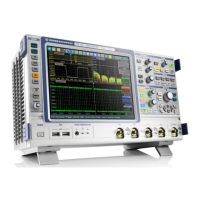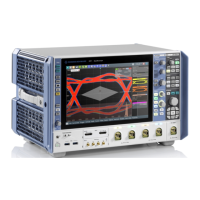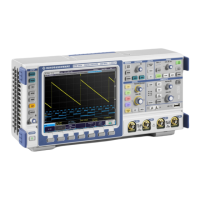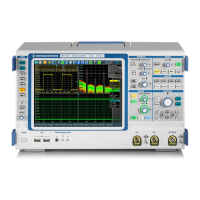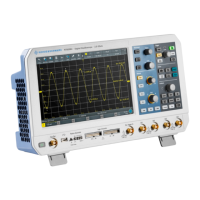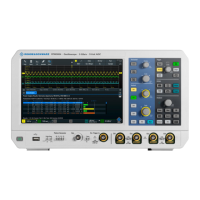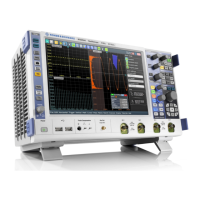Protocol analysis
R&S
®
RTP
827User Manual 1337.9952.02 ─ 12
●
SEARch:RESult:USB:PACKet<m>:PID? on page 2041
●
SEARch:RESult:USB:PACKet<m>:PORT? on page 2041
●
SEARch:RESult:USB:PACKet<m>:SC? on page 2042
●
SEARch:RESult:USB:PACKet<m>:SEU? on page 2042
13.18.5.3 Searching USB data
Prerequisite: A serial bus is configured for the USB signal to be decoded and analyzed.
The search for events is set up in the following way:
1. Press [Search] or tap "Search" > "Setup" in the menu bar.
2. If the dialog box does not contain a search entry, tap the "Add" icon to create one,
as described in "To create a user-defined search" on page 463.
3. Tap "Source" and select the serial bus that is set to USB 2.0 (e.g. "SerBus1",
unless already selected).
4. Specify search criteria according to Chapter 13.18.5.1, "USB 2.0 search setup",
on page 821.
5. To acquire a waveform, press [Single].
The R&S RTP performs a USB 2.0 decode according to the thresholds and proto-
col settings of the associated serial bus source (here in our example SB1).
6. To start searching the acquired waveform for specific events, tap "Enable" in the
search setup dialog.
The R&S RTP displays the "Search Results" box that lists the detected events.
For information on how to configure the search results presentation and how to navi-
gate the search results, see also "To display search zoom windows" on page 470.
13.19 USB 3.1 (option R&S RTP-K61/K62)
Option R&S RTP-K61 analyzes Universal Serial Bus (USB) signals encoded by the
USB 3.1 Gen1 coding standard. To use the full functionality of the option, you need an
instrument that covers the frequency range up to 5 GHz, because the USB 3.1 Gen 1
protocol is defined for data rates up to 5 GHz.
Option R&S RTP-K62 analyzes USB signals encoded by the USB 3.1 Gen2 coding
standard.
For analysis, USB 3.1 encoded signals can be triggered, decoded and searched.
This chapter describes:
USB 3.1 (option R&S
RTP-K61/K62)
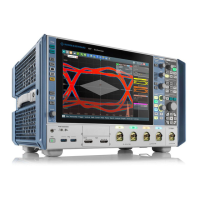
